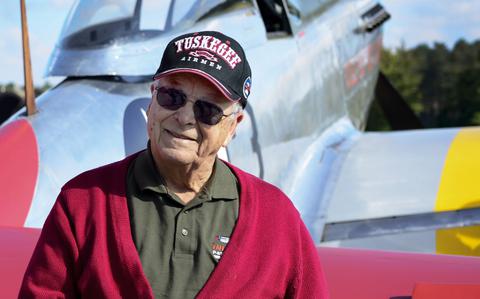Honoring the Legacy of Retired Lt. Col. George E. Hardy: A Tuskegee Airman
One of the last surviving Tuskegee Airmen, retired Lt. Col. George E. Hardy, has passed away at the age of 100. This significant loss was confirmed by the Tuskegee Airmen, Inc. National Office, which expressed deep gratitude for Hardy’s extraordinary contributions and lasting legacy. His remarkable story encapsulates not only an era of courageous fighters but also the resilience and determination that defined the Tuskegee Airmen.
Trailblazer in the Face of Adversity
Lt. Col. Hardy is remembered for his exceptional courage and skilled piloting during a time when systemic racism and prejudice created immense barriers for African Americans. The Tuskegee Airmen, Inc. National Office paid tribute to his bravery, highlighting the indomitable spirit that characterized both his life and career. Hardy’s journey from a young aviator to a distinguished veteran exemplifies the struggles and triumphs faced by those who fought not just for their country but also for their dignity.
The Combat Missions
During World War II, Hardy flew 21 combat missions over Germany and its occupied territories, commanding a P-51 Mustang. His role often involved escorting heavy bomber formations, ensuring the safety of those completing critical missions. At just 19 years old, he became the youngest Red Tail fighter pilot, showcasing remarkable bravery during his initial combat sorties. Hardy’s military career did not stop with World War II; he also completed 45 missions during the Korean War and an impressive 70 during the Vietnam War, demonstrating his lifelong commitment to service.
The Tuskegee Experience
Hardy joined the U.S. Army Air Forces in 1944, completing the Aviation Cadet Training Program at the historic Tuskegee Army Air Field in Alabama. He was deployed to Italy in early 1945 and served with the African American 99th Fighter Squadron, which was part of the renowned 332nd Fighter Group. This group is celebrated for its significant role in combat, flying more than 15,000 sorties and earning accolades for their exceptional performance against enemy aircraft. Hardy’s involvement as part of this legendary crew reflects the pioneering spirit and dedication that the Tuskegee Airmen embodied as they challenged stereotypes and fought for their country.
A Legacy of Advocacy
After nearly three decades of dedicated military service, Hardy retired in 1971 with the rank of lieutenant colonel. However, his commitment to the history and legacy of the Tuskegee Airmen did not end with his military career. He became an advocate, sharing the often-overlooked stories of African American pilots and their contributions to the United States. Hardy traveled across the country, educating audiences about the fighter group’s role and the barriers they broke through, ensuring that their legacy would not be forgotten.
A Life of Academic and Professional Achievement
Born in 1925 in Philadelphia as the second of seven children, Hardy was no stranger to challenges. He pursued higher education with unwavering determination, earning a bachelor’s degree in electrical engineering and a master’s in systems engineering from the U.S. Air Force Institute of Technology in Dayton, Ohio. Beyond his remarkable aviation career, he contributed significantly to the development of the Defense Department’s first worldwide military telephone system, marking his impact not only in the skies but also on the ground.
Pioneering Spirit of a Generation
Hardy’s life encapsulated the pioneering spirit of the Tuskegee Airmen—a distinguished group of all African-American pilots who, against all odds, showcased their commitment and competence. Hardy’s passing marks the loss of not just a brave soldier but also a vital chapter in American history, reminding us of the sacrifices made for the freedoms we enjoy today. His legacy serves as an enduring inspiration, highlighting the importance of perseverance, courage, and the fight for equality.



